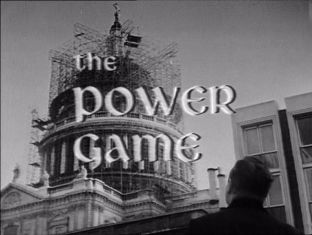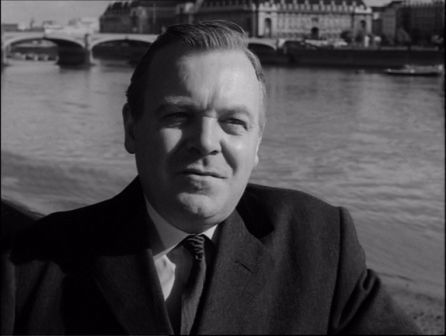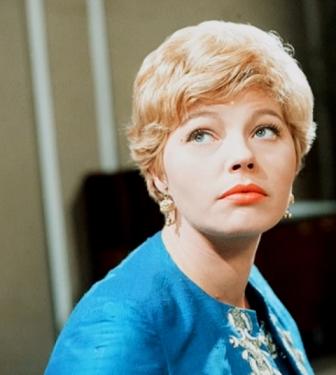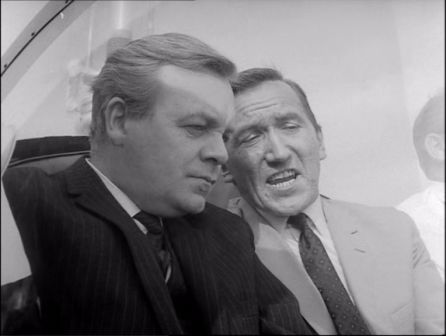
27 December 1965
"Hagadan". Writer Peter Draper. Director Quentin Lawrence
“London holds on to people, no matter what it does to them.” Susan Weldon
Joint-Managing Directors Ken Bligh (Peter Barkworth) and Sir John Wilder (Patrick Wymark) are separately backing two different projects for Bligh Construction. Ken favours an African Dam, while Wilder is pushing for the new M27 motorway. Taking on both projects would leave the company over-stretched, so only one can win.

Pamela Wilder (Barbara Murray) suspects Wilder is having another affair, but doesn’t know it’s with Susan Weldon (Rosemary Leach). Over lunch Pamela tells Wilder that divorce is not an option. In Italy, Wilder hires Frank Hagadan (George Sewell), an ambitious engineer who has plans for a machine which can cut the time (and therefore the cost) of motorway construction.
Returning from Italy with Susan, Wilder is seen at Luton airport by Angela, a friend of Pamela’s. When Pamela casually brings the subject up, as if it was a piece of abstract gossip, Wilder refuses to discuss Susan’s identity with Pamela, snapping “I don’t see it’s any of Angela’s business”. Wilder brings the newly arrived Hagadan to his house for dinner. The following day, Susan meets with an enquiry agent who tells her that after Wilder took Hagadan back to his hotel, he spent two hours at a woman’s flat in Notting Hill Gate. Susan goes to the Bligh Construction office, and accidentally meets Hagadan in the foyer. She agrees to join Hagadan for lunch.
Henderson (Jack Watling) and Wilder have been researching Bligh Construction’s past activities and have found that there is no final report on the Ashani Dam project. Following a lead given to him by Susan, Wilder meets with Alan Lacey (John Humphrey), a Parliamentary Private Secretary, who tells him that Ken Bligh underestimated the bid for the Asahi Dam and the project had to be bailed out with money from the World Bank. Wilder reminds Lacey that the UK Government is underwriting the latest Dam project, and while Bligh’s may put in a bid, hints that he would not want to be associated with a project that has a chance of failure.
This third episode may seem to contradict the previous two segments – Elbertson’s got involved with Bligh Construction to finance £7 million of overseas expansion and Wilder stressed in the second episode that his seat on the National Export Board was important because he wanted to take Bligh international. But in this episode, Wilder opposes Ken Bligh’s African adventure in favour of a British motorway project. The reason for Wilder's about-turn is that Ken Bligh is vague about the profitability of the African project, and Wilder needs to show success at his co-Managing Director’s expense. Wilder and Henderson have exploited Ken and his conflict with the domineering Caswell Bligh (Clifford Evans) to gain entry to the company, but now have to undermine the son.
Ironically, Caswell is president of the National Motorways Council and was heard berating the Government for cuts to road building in the first episode. Ken expresses the view in this episode that motorways are a short term win; the UK has a finite capacity for new roads – the roads will be built regardless of who wins the contract. Africa, with its much greater area, offers a long-term future in construction. Ken lobbies Caswell to use his seat on the National Export Board to ensure Bligh’s win the African contact. But he is unaware of Wilder’s much subtler tactic in sowing doubt with Parliamentary Private Secretary Alan Lacey that the African bid is nothing more than “a personal whim” that Wilder does not expect to succeed.
After the waspish and brutal overtones of the previous episode, Peter Draper’s script packs in more incident, but takes a more elegant approach to exploring Susan Weldon's motivation. Draper and director Quentin Lawrence had collaborated on “The Plane Makers” episode, “Don’t Stick Your Head Out” in which Kate Barber (Ingrid Hafner) outlined the parameters of her life as Wilder’s mistress.

In this episode, Susan Weldon is less able to take Barber’s pragmatic view. She is unhappy with her status (“whatever the word is, whatever I am”). When Wilder laughs off a mistake with cooking the evening meal, she says if they were married he would be irritated by a mistake, and then asks if he is ever going to marry her.
Unlike Kate Barber, who tolerated her position as a mistress because she didn’t feel competent in any job, Weldon is a university graduate and high level civil servant who has risked dismissal and possible prosecution by passing information to Wilder. Rosemary Leach is totally convincing as an intelligent, successful career woman who is “inefficient” I her personal life. She’s totally convincing when she tells Wilder,“I do actually, and in fact love you”. Ominously, when Susan tells Wilder about her previous affair with a married man, it sounds very similar to Barber’s description of her life with Wilder. Susan is unwilling to return home to Dorset. Half the women in her apartment block are separated from their husbands (one divorced at 19), all unwilling to return home, all drawn to London.
The atmosphere of the first part of the episode is like a standalone play about an extramarital affair. Wilder and Susan move from her flat, to a pub, to an Italian restaurant talking about life. “The Plane Makers” had been notable for using ATV’s outside broadcast cameras (only used on Saturdays for sports events) to record exterior scenes as a cost cutting measure. “The Power Game” uses the standard procedure of videotaped interiors and filmed exteriors. Quentin Lawrence literally goes to town with a surreal sequence filmed entirely from the window of a taxi showing the night streets of London as Wilder and Susan have a conversation entirely in voiceover. Film cameras also capture Wilder’s first meeting with Frank Hagadan, observing construction of an Italian motorway from the vantage point of a helicopter.
The mechanics of motorway construction are outlined throughout this episode. Wilder compares it to being like a “jobbing builder” – the design of the motorway is put out a separate firm with the constructor being responsible only for making it happen. Ken Bligh takes Wilder to their current road-building project. Ken tells Wilder a long schedule is safest. “The M1 took 19 months to complete and is costing 5 and a half million to put right.” Hagadan tells Wilder that in Italy, highways are built faster (and therefore cheaper) because there are no planning procedures as in England (“In England everyone wants motorways, but not in their back garden. In Italy…if a back garden’s in the way, it goes straight through”).
If it's unlikely that many of the audience would approve of Hagadan's viewpoint, it underlines that there may be a reason why public works always exceed their busget. There is a price to be paid for democracy.
When Hagadan explains his plan for a machine that will compact the foundations of a motorway, Wilder meets with Magister (Peter Madden), whose firm will design the motorway, to confirm that it is possible for a contractor to suggest an alternative schedule with two separate prices. This is the key to Bligh Construction undercutting its competitors. Magister deduces that Wilder is hoping to bring in a new machine, but warns him that if they win on the cheapest bid, Bligh Construction will bear the cost of any cost over-run.

The title character of Frank Hagadan is played by George Sewell, who had made his stage debut aged 35 with Joan Littlewood’s Theatre Workshop in“Fings Aint What They Used T’Be”. This led to appearances in films (This Sporting Life 1963) and TV (The Gideon’s Way episode “Boy With Gun”). Sewell’s background as a merchant navy steward and travel courier was distinct from that of the classically trained actors in the cast, although his performance as Hagadan is assured.
The scenes between Pamela Wilder (Barbara Murray) and Hagadan are delicately handled. In earlier scenes, Pamela has made it clear that she will not divorce Wilder, but she is enraged enough to have him followed. She is aware of his previous affairs and has confronted Wilder over the identity of his latest (“I saw Joanna yesterday. She said Kate is in America so it isn’t Kate"). She accepts Hagadan’s invitation to lunch when she learns Wilder has spent time at Susan Weldon’s flat.
Even so, she pulls away from a passionate kiss with Hagadan at his flat. He puts her coat on telling her, “Women like the idea of having lovers, but when they’re alone in a room with a man, they’re not so sure about it. Eventually they can’t wait to get out of that room again, back to where everything is the same as it was before”
In “The Plane Makers”, Pamela had a sexless friendship with Henry Forbes (Robert Urquhart), and while still not willing to make a transition, she asks Hagadan to take her somewhere for a drink. Hagadan characterises her as, “The sort of woman that would rather not have lovers…be completely happy with their husband. But you’re not.”
In contrast to the previous episode, Wilder is able to show enough charm for it to seem credible when Susan declares her love for him. At the same time, a very natural flurry of emotions passes through his head as wriggles away from Susan’s plea that he indicates there’s a possibility of marriage. “If I was single…if there was nothing in the way…we probably would be married by now.”Later, Wilder declares that Pamela wants him as he was ten years ago and laments that, “Everything wears out. Living demands the continuous production of waste. We use up people as we use up everything else.” Susan resignedly says “As you will eventually use me up,’And throw sweet flowers upon love’s grave.’ ”